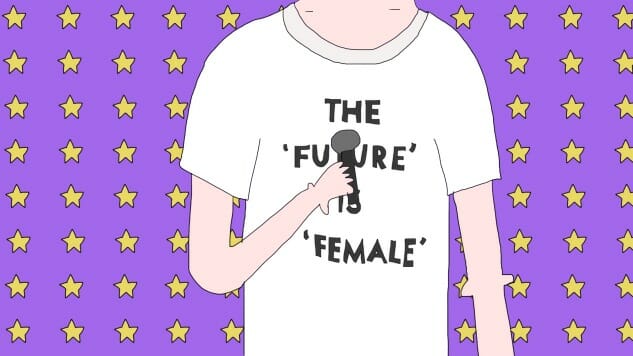“Ironic Sexism” Is Just Sexism If You’re Being Sexist

The million dollar question: where’s the line between irony and perpetuating a damaging idea?
A proposed answer: substitute the word “ironic” with “lazy” in regards to almost anything and you’ll probably be a little closer to the truth.
This question comes to us by way of an interaction and the subsequent internet fallout of an exchange that took place at a Q&A session after the sold-out “Kyle Mooney Live” at Thalia Hall in Chicago this week. The part-live-part-video show was done in part to promote their upcoming movie Brigsby Bear and featured three fourths of YouTube-sketch-group-turned-mainstream-stars Good Neighbor (Kyle Mooney, Dave McGary and Nick Rutherford, with Beck Bennett missing from the lineup). Chicago comedian and Good Neighbor fan Lily Reed challenged Rutherford on an “ironically sexist” character he’d performed earlier in the night, and the rest is history.
Here’s a piece of her account, posted to Facebook the day after the Chicago show (full post available here):
Rutherford appears to have corroborated Reed’s account, which went on to detail a one-on-one interaction after the show, on Twitter and says to be “embarrassed” by the incident and “sickened by the way our fans treated her.” Reed’s question at the Q&A session was in response to a stand-up character bashing women Rutherford had played earlier in the night, deploying lines like:
“I wish I was a woman. If I was a woman, I’d put out so much, get so much free shit.”
“Remember in the old times when women would just walk up to a man and slap them across the face for no reason? Women, you should do that now!!”
“Women have it easy—they can wear whatever they want.”
By Reed’s own definition, and in a lot of other Good Neighbor characters (Mooney’s Bruce Chandling is an example), these lines are spoken with the understanding that their audience knows how reductive and stupid it is to say and don’t actually mean it. You can find similar displays every time a Silver Lake hipster wears a MAGA hat, or when I try to make my friends watch The Master of Disguise when I feel like I’m doing a bad job of having people over. The whole point of irony-laden routines like this is the understanding that the performer knows better than to insult women, and a good way to demonstrate that you are aware that this routine is ironic is to not insult a woman for challenging that. A good way to demonstrate that you’re benefitting from the status quo and using the invisibility cloak of irony to remain the “good guy” is to essentially tell that woman to go fuck herself, first in a packed theater and later in private.
Since Good Neighbor released regular videos between 2007 and 2012 on several different YouTube channels, a lot of ironic humor has fizzled out as more diverse voices slowly creep their way into the mainstream and policies at training centers are adjusted to be more inclusive and less of a space for privileged people to demonstrate how right they are about things. In terms of what you could get away with saying on the internet, it was a simpler time for all of us—scroll far down enough in anyone’s profile and you’ll probably find something that would not be okay to say now, exemplified by any “old tweets” story that surfaces every time a new cast member or host is hired for anything. Good Neighbor is no exception—videos like “is my roommate gay?” and “retarded but not” (released in 2007 and 2008 respectively) wouldn’t play with the kind of audience they want if they were released today, and the group probably realizes that. It’s when a member of this same group jokingly tells a female audience member to take her top off when she challenges him on something that the whole operation requires a second look.
-

-

-

-

-

-

-

-

-

-

-

-

-

-

-

-

-

-

-

-

-

-

-

-

-

-

-

-

-

-

-

-

-

-

-

-

-

-

-

-









































